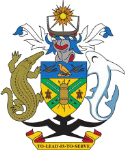The Land and Titles (Amendment) Act 2014, including the new Land Board became effective on 1st December 2014. The Land Board wasted no time, by meeting for the first time on the very same day.
Permanent Secretary for Lands, Stanley Waleanisia, said it is a historical day for Solomon Islands. Speaking after the first Land Board meeting, the Permanent Secretary said that the Amendment Act and the Land Board have come about as a result of the perceived corrupt practices of the past, and so that responsibility for land matters now rests with a Board consisting of 12 voting members instead of that power resting solely with the Commissioner of Lands. He said that the work involved in amending the Act started several years ago, and that it took until May this year before Parliament finally passed the
amended legislation.
The members of the Land Board are determined according to the Act, and they include a number of Permanent Secretaries, the Heads of various Divisions of the Ministry of Lands,
Housing & Survey, as well as members appointed by the Minister. The Permanent Secretary explained that the first meeting of the Board was essentially an induction led by the Ministry’s Chief Technical Adviser Alan McNeil, who outlined the Board’s various responsibilities and powers. The position of Commissioner of Lands remains, but this position has reduced powers and now acts as secretary to the Land Board and acts on the Board’s decisions.
The Permanent Secretary explained that the Land Board now has the power to allocate and transfer land, and other related responsibilities. He added that the general public should not see a significant difference in how land matters are dealt with, but that there will be an additional step in the Ministry’s processes, in that the Commissioner will now have to refer land matters to the Board for a decision, rather than the Commissioner making that decision. The Permanent Secretary said he hoped that this reform might reduce the long line of people wanting to see the Commissioner, because the Commissioner will no longer
be making the decisions on land matters.
Other changes to the Land and Titles Act include greater transparency in decision-making, as the Board’s Minutes and details of all land applications and transfers must be made public. The Board will also have greater powers to forfeit Fixed Term Estates, and the period for submitting appeals against forfeitures has been reduced from six months to one month. The Minutes of the Board’s first meeting will be available shortly from the Commissioner’s office at the Ministry of Lands, Housing & Survey.

